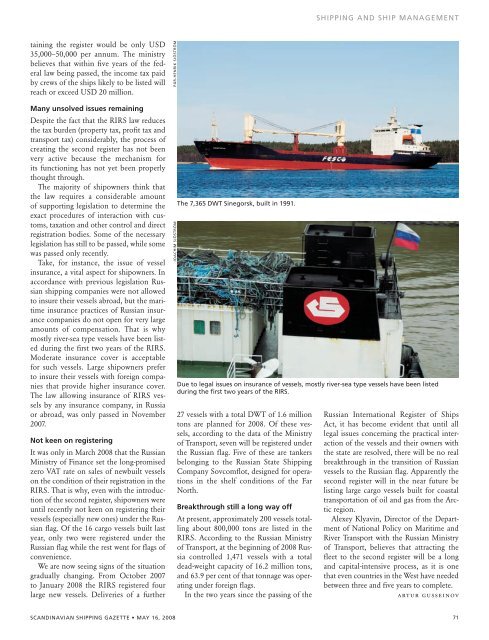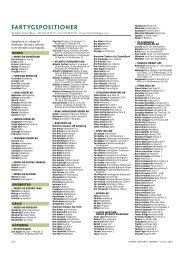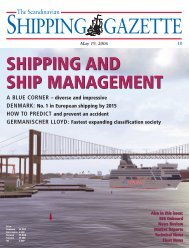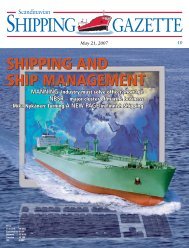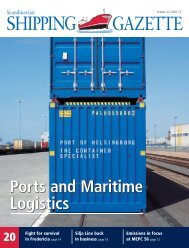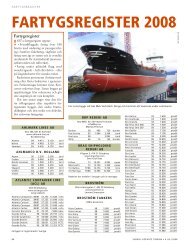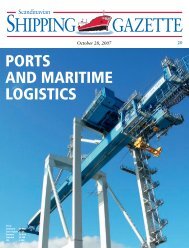SSG No 10 - Shipgaz
SSG No 10 - Shipgaz
SSG No 10 - Shipgaz
- TAGS
- shipgaz
- shipgaz.com
You also want an ePaper? Increase the reach of your titles
YUMPU automatically turns print PDFs into web optimized ePapers that Google loves.
taining the register would be only USD<br />
35,000–50,000 per annum. The ministry<br />
believes that within five years of the federal<br />
law being passed, the income tax paid<br />
by crews of the ships likely to be listed will<br />
reach or exceed USD 20 million.<br />
Many unsolved issues remaining<br />
Despite the fact that the RIRS law reduces<br />
the tax burden (property tax, profit tax and<br />
transport tax) considerably, the process of<br />
creating the second register has not been<br />
very active because the mechanism for<br />
its functioning has not yet been properly<br />
thought through.<br />
The majority of shipowners think that<br />
the law requires a considerable amount<br />
of supporting legislation to determine the<br />
exact procedures of interaction with customs,<br />
taxation and other control and direct<br />
registration bodies. Some of the necessary<br />
legislation has still to be passed, while some<br />
was passed only recently.<br />
Take, for instance, the issue of vessel<br />
insurance, a vital aspect for shipowners. In<br />
accordance with previous legislation Russian<br />
shipping companies were not allowed<br />
to insure their vessels abroad, but the maritime<br />
insurance practices of Russian insurance<br />
companies do not open for very large<br />
amounts of compensation. That is why<br />
mostly river-sea type vessels have been listed<br />
during the first two years of the RIRS.<br />
Moderate insurance cover is acceptable<br />
for such vessels. Large shipowners prefer<br />
to insure their vessels with foreign companies<br />
that provide higher insurance cover.<br />
The law allowing insurance of RIRS vessels<br />
by any insurance company, in Russia<br />
or abroad, was only passed in <strong>No</strong>vember<br />
2007.<br />
<strong>No</strong>t keen on registering<br />
It was only in March 2008 that the Russian<br />
Ministry of Finance set the long-promised<br />
zero VAT rate on sales of newbuilt vessels<br />
on the condition of their registration in the<br />
RIRS. That is why, even with the introduction<br />
of the second register, shipowners were<br />
until recently not keen on registering their<br />
vessels (especially new ones) under the Russian<br />
flag. Of the 16 cargo vessels built last<br />
year, only two were registered under the<br />
Russian flag while the rest went for flags of<br />
convenience.<br />
We are now seeing signs of the situation<br />
gradually changing. From October 2007<br />
to January 2008 the RIRS registered four<br />
large new vessels. Deliveries of a further<br />
PäR-HENRIK SjöSTRöM<br />
jOACHIM SjöSTRöM<br />
The 7,365 DwT Sinegorsk, built in 1991.<br />
27 vessels with a total DWT of 1.6 million<br />
tons are planned for 2008. Of these vessels,<br />
according to the data of the Ministry<br />
of Transport, seven will be registered under<br />
the Russian flag. Five of these are tankers<br />
belonging to the Russian State Shipping<br />
Company Sovcomflot, designed for operations<br />
in the shelf conditions of the Far<br />
<strong>No</strong>rth.<br />
Breakthrough still a long way off<br />
At present, approximately 200 vessels totalling<br />
about 800,000 tons are listed in the<br />
RIRS. According to the Russian Ministry<br />
of Transport, at the beginning of 2008 Russia<br />
controlled 1,471 vessels with a total<br />
dead-weight capacity of 16.2 million tons,<br />
and 63.9 per cent of that tonnage was operating<br />
under foreign flags.<br />
In the two years since the passing of the<br />
SHIPPING AND SHIP MANAGEMENT<br />
Due to legal issues on insurance of vessels, mostly river-sea type vessels have been listed<br />
during the first two years of the RIRS.<br />
Russian International Register of Ships<br />
Act, it has become evident that until all<br />
legal issues concerning the practical interaction<br />
of the vessels and their owners with<br />
the state are resolved, there will be no real<br />
breakthrough in the transition of Russian<br />
vessels to the Russian flag. Apparently the<br />
second register will in the near future be<br />
listing large cargo vessels built for coastal<br />
transportation of oil and gas from the Arctic<br />
region.<br />
Alexey Klyavin, Director of the Department<br />
of National Policy on Maritime and<br />
River Transport with the Russian Ministry<br />
of Transport, believes that attracting the<br />
fleet to the second register will be a long<br />
and capital-intensive process, as it is one<br />
that even countries in the West have needed<br />
between three and five years to complete.<br />
artur gusseinov<br />
SCANDINAVIAN SHIPPING GAZETTE • MAY 16, 2008 71


